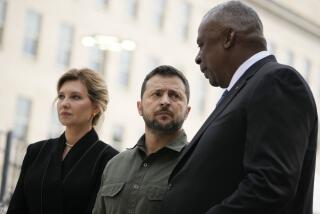Cohen Hedges on Nuclear Arms Report
- Share via
WASHINGTON — Defense Secretary William S. Cohen said Monday that deeper cuts in U.S. and Russian nuclear arms would save scarce defense funds in both countries, but he refused to say whether the Pentagon had pressed Congress to make unilateral cuts.
He was asked at a news conference about a New York Times article saying the Pentagon had quietly recommended in a report in April that Congress consider unilateral cuts because of weakening security threats coupled with budget concerns.
Cohen said the military, under orders from Congress, is exploring a variety of options on nuclear disarmament but called the report “a highly classified document.”
“We intend to keep it at that level for the time being,” he told reporters.
The New York Times reported that senior Clinton administration officials said the military’s proposed cuts would reduce the U.S. arsenal below the 6,000 nuclear warheads allowed each side under the first strategic arms reduction treaty, or START-1.
Defense officials, who asked not to be identified, said Monday that the Navy and Air Force as well as the Energy Department would like to see the U.S. arsenal slashed because it costs billions of dollars a year to maintain warheads that will never be used.
But they stressed that the United States does not want to send the wrong signal on unilateral cuts to Russia’s Duma, the lower house of parliament, which has not ratified the START-2 treaty to bring nuclear warheads on each side down to between 3,000 and 3,500.
“As I have indicated before, it is costly to the United States to maintain those [START-1] levels,” Cohen told reporters.
“It is more costly to Russia to maintain those levels. And that is the reason why we have tried, on each and every occasion, to persuade our Russian counterparts it is in their interest, as well as the United States, to ratify START-2 as quickly as possible so we can reduce the levels and then move on to START-3.”
There have been signals from Moscow that the conservative Duma is moving toward passage of START-2, perhaps as early as December, because Russia cannot afford to maintain its present nuclear arsenal in the throes of a devastating financial crisis.
More to Read
Sign up for Essential California
The most important California stories and recommendations in your inbox every morning.
You may occasionally receive promotional content from the Los Angeles Times.













